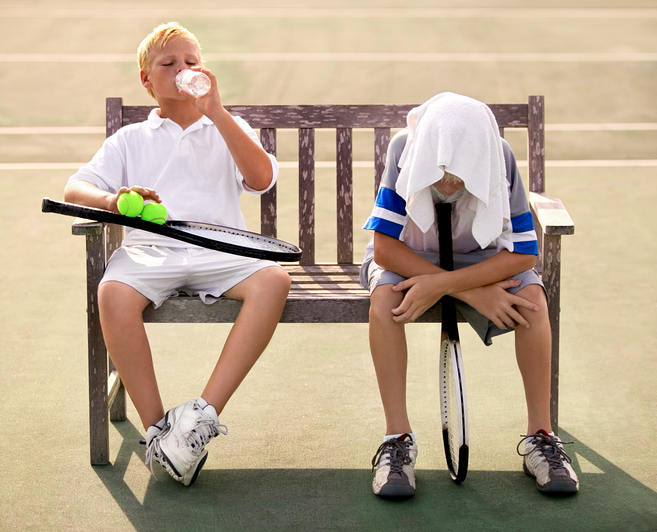
Children and teenagers participating in summer athletics, including strength and conditioning camps and sports-focused camps, are at risk for heat illness. It’s important for youngsters, as well as their parents and coaches supervising them, to be aware of measures to prevent heat illness. Risk factors for heat illness include lack of fluid intake; being overweight; poor physical conditioning; lack of sleep; and wearing tight clothing, layers or dark clothes.
Hydration
Children and teens should drink plenty of water. Water is the best hydrating fluid. Encourage children and teens to drink milk with their meals; an 8 oz. glass of milk (cow’s milk, soy milk) has more sodium and potassium than 8 oz. of sport drink. Young athletes should avoid caffeinated drinks (soft drinks, coffee, tea) that will cause increased urine production and water loss. Guidelines for fluid replacement for exercise are as follows:
- Drink 16 to 20 oz. of fluid four hours before exercise.
- Drink 3 to 8 oz. every 15 to 20 minutes during exercise.
- Sports drink may be added if doing continuous exercise for longer than 1 hour.
Looking at the color of your urine is a very useful way of check hydration. If your urine is the color of apple juice or darker, you are dehydrated and need to drink more.
Overweight and poor physical conditioning
Children and teens who are overweight or not in good shape need to be extra careful about exercising in the heat. They should gradually increase their outdoor activity until they are comfortable doing exercise in the heat. This may take two to three weeks. Overweight or out of shape youngsters may want to get used to exercising in the early morning or evening before they exercise during the hotter parts of the day.
Sleep
This is something that is rarely discussed when talking about avoiding heat illness, but is very important. Lack of adequate sleep, or being chronically tired, lowers the body’s ability to tolerate exercise in the heat. Teenagers especially tend to stay up late during the summer months. However, if they are involved in athletics during the summer, it is very important they get a minimum of eight hours (younger children nine to 10 hours) of uninterrupted sleep in order to decrease their chances of heat illness.
Clothing
Young athletes exercising in the heat should wear loose fitting, light colored clothing. Loose clothing allows air to circulate next to the skin. Darker clothes absorb more of the sun’s heat. Leggings and tight fitting shirts may look “cool,” but may actually make it harder for the athlete to stay cool.
Parents can help their young athletes by reminding them of all of the above, as well as making sure they go to practice or games with a water bottle. Coaches should allow athletes to get water whenever they want, and should schedule water breaks every 15 minutes or sooner.
Athletes should be encouraged to tell someone immediately if they begin feeling bad in the heat. Early symptoms of heat illness include headache, dizziness, stomach ache, nausea, muscle cramping and suddenly feeling very tired or weak.